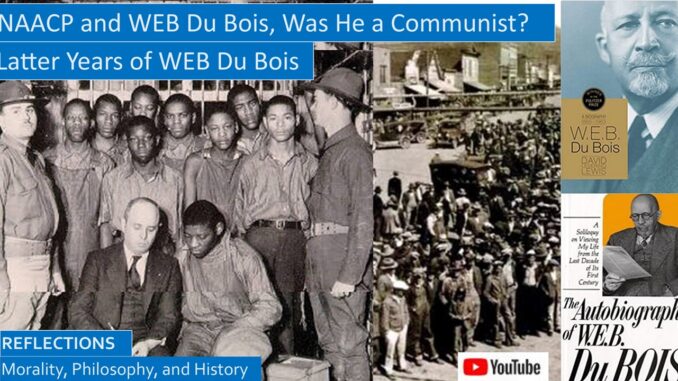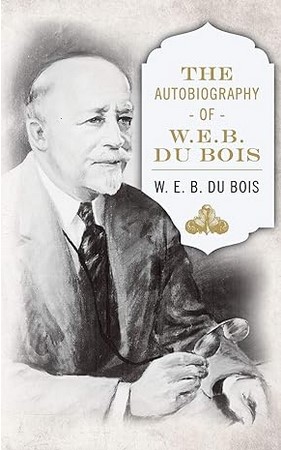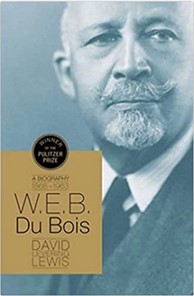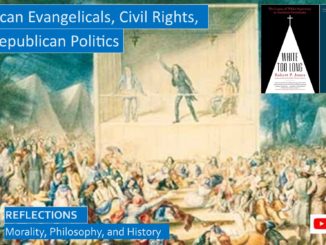
Was WEB Du Bois a communist? The answer is YES: When he turned 93, he joined and paid his dues to the CPUSA, Communist Party. Most people are born in the first chapters of their autobiography; but no, WEB Du Bois, being ever the contrarian, chooses to extol the virtues of communism in the opening chapters. Personally, I am quite angry with him, why did he do that? It is political poison for a black leader to announce he is a communist, and now I must explain it. We will reflect on his growing embrace of communism over the course of his life.
We would like to emphasize that neither WEB Du Bois, nor anyone from the NAACP, ever even hinted that the government should be overthrown by a violent Bolshevik uprising. On the contrary, the NAACP funded a decades long effort to slowly reverse discrimination in the court system. If you ask Dr Google about “WEB Du Bois firearms” you will discover that WEB Du Bois and the NAACP did encourage blacks to exercise their Second Amendment rights to bear arms for self-defense, which was sometimes needed against armed white supremacists and mobs.
Script for this video, with more Amazon book links: https://www.slideshare.net/BruceStrom1/was-web-du-bois-a-communist-the-later-years-of-naacp-cofounder-and-civil-rights-activist
This YouTube video: https://youtu.be/YwgrKvIjoc0
WEB Du Bois chooses to begin his autobiography: “I believe in communism. I mean by communism, a planned way of life in the production of wealth and work designed for building a state who seeks the highest welfare of its people and not merely to profit the few. I believe that all men should be employed according to their ability and that wealth and services should be distributed according to need.”[1]
If we but reflect on the life experiences of WEB Du Bois, we can understand the appeal of communism, or at least the theoretical communism of Karl Marx, not the terrors of Soviet or Chinese Communism. In his day, during the Jim Crow era, the government denied due process and equality to blacks, they were forced to work for starvation wages, and if blacks called the police, often they were the ones arrested! Tens of thousands of blacks were lynched during the Jim Crow years, and often the police condoned or even participated in the lynchings. Progress on improving civil rights was just glacial before the civil rights era of the 1960’s.
We cannot excuse this foolish decision to join the Communist Party, but we can explain it. WEB Du Bois visited Soviet Russia in the heady revolutionary days, before the Purge Trials of Stalin, and he was duped into believing that this was a worker’s paradise. There was genuine enthusiasm among the party faithful, and there were many liberals who were so thoroughly disgusted with capitalism when the economy collapsed in the Depression, where there was so much economic misery and unemployment, while Soviet Russia appeared, on the outside, to be much more prosperous.[2]
Even the patrician President Franklin Roosevelt was disappointed with big business and their reaction to the Depression. He insisted on appointing the socialist Henry Wallace as his third Vice President, but he was so far left wing that moderates and conservatives insisted on nominating Harry Truman as the fourth Vice President. FDR then appointed Henry Wallace as Secretary of Commerce, but Truman fired him when he gave a speech urging conciliation with the Soviet Union.[3] Some scholars speculate that he may have been a Russian asset, a scary thought since he was one heartbeat away from the Presidency.
WHEN DID WEB DU BOIS START LEANING TOWARDS COMMUNISM?
When did WEB Du Bois start leaning towards Communism? In his autobiography, WEB Du Bois comments on his thoughts on communism throughout his long life. Even in high school, he mentions his oration on the abolitionist Wendell Phillips, whom he said was admired even though he was a socialist.[4] Likewise, he mentions that socialism and communism were not a focus of his studies in his various colleges.
When his national profile was rising and the tensions with Booker T Washington were increasing, he notes that while a professor at Atlanta University that the teachings of Marx and Engels were not stressed when studying economics.[5]
WEB Du Bois’ autobiography hints that he started pondering socialism in the days of the Niagara Movement. One of the proclamations of Niagara movement that preceded the founding of the NAACP was the insistence that the “laws be enforced against rich as well as poor; against Capitalist as well as Laborer; against white as well as black.”[6]
In the years before World War II, quite often socialism was synonymous with communism, although they became more distinct in the Spanish Civil War when the moderate socialists battled with and lost control of the Spanish Republican Party to the communists under the direction of Stalin. Today Socialism is not synonymous with communism, and Christian Socialism is a major political movement in Europe and has been for decades.
In the early years when he was the founding editor of the Crisis, the magazine that promotes the program of the NAACP, WEB Du Bois did not publish articles about socialism and communism, instead concentrating on racial issues such as lynchings, race riots, and also self-improvement articles targeted to their black audience.
YOUTUBE
WEB Du Bois’ editorial views on organized labor and socialism were complicated. Although he supported the cause of unions in principle, in practice many unions would not allow blacks to join. Likewise, the socialists emphasized class struggle, not the struggle between races.[7] In a 1919 editorial in the Crisis, WEB Du Bois proclaimed, “We do not believe in revolution. We expect revolutionary changes to come mainly through reason, human sympathy, and the education of children, and not by murder.”[8] WEB Du Bois saw the domination of black workers by white workers as a greater threat to blacks than the domination of workers by capitalists.[9]
Shortly before his resignation from the NAACP, he dedicated an issue of the Crisis to “Negro Editors on Communism.” Many editors contributed to this anthology, some editors speculated that communism was a reaction to the economic and racial consequences of the Depression, others noted that, among the whites, only Communists advocated the equality of Negroes. WEB Du Bois noted that none of the editors called for abolishing the market economy or for studying classical Marxism.[10]
SCOTTSBORO BOYS TRIAL, CPUSA vs NAACP
The Scottsboro Boys Trial was the George Floyd event early in the century., this pitted the Communist Party against the NAACP. The NAACP was the leading civil rights organization, but the upstart CPUSA, the Communist Party of America, wanted to champion the cause of blacks to further the cause of communism. There were tensions and name calling during the Scottsboro Trials incident.
What happened? In Chattanooga, Tennessee, in 1931 there was a rumble on a freight train between some black hoboes and white hoboes, and the whites were thrown off the train. The whites complained to the sheriff about being attacked by a “bunch of niggers.” Southern justice prevailed, but when the sheriff in the next town arrested nine Negro boys, from age thirteen to nineteen, they were surprised that two white prostitutes accompanying them! They claimed they had been raped by the black boys, likely to keep themselves out of trouble for consorting with blacks. Four days later, jury trials sentence all but one of the boys to death. The governor dispatched National Guard troops to prevent a lynching.
When they learned of the convictions, the NAACP was reluctant to take the case, their lawyers preferred defendants with squeaky clean reputations, and black hoboes traveling with white prostitutes were anything but clean. But the CPUSA lawyers offered to represent the black youths in their appeals, the Communists saw a possible public relations victory in the publicity.
WEB Du Bois commented in the Crisis that a train ride with two prostitutes was “no crime, except in the slave belt. The unwritten penalty for that sort of social equality in Alabama is death.” Walter White of the NAACP met with the prisoners, offering to replace their attorneys with the NAACP attorneys. He was denounced by their parents, many blacks preferred the aggressive, public tactics of the Communists. There were also harsh words traded by the NAACP and the CPUSA. Eventually, attorneys from both the NAACP and the CPUSA cooperated somewhat in the appeals.
The appeals and retrials surrounding the Scottsboro boys spanned decades, with the Alabama Supreme Court ruling on the case, and the US Supreme Court ruling on the cases twice. The US Supreme Court overturned the verdicts stating that due process required that blacks be included in the jury pool. The eventual fate of the defendants varied, some died in prison, others were released many decades later, some were rearrested on other crimes.[11]
WEB DU BOIS AND THE PAN-AFRICAN MOVEMENT
The NAACP tolerated WEB Du Bois’ participation in the Pan-African movement, which seeks to strengthen the bonds between Africans in Africa and other countries. The movement also sought to end colonialism and encourage the integration of newly independent former colonies into the world economy and culture. The NAACP did not want to be distracted from its legal struggles to combat discrimination and segregation.
In his autobiography, WEB Du Bois said he did not view communism was useful to assist blacks in America in fighting racism, he saw communism in the light of the Pan African movement that sought to end colonial rule in Africa. He had called Pan African Congresses in 1919, 1921, and 1923, but he found limited support among American blacks, and no support from his fellow leaders of the NAACP.[12]
WEB Du Bois’ attitudes about communism were influenced by his views on colonialism, and we must remember he was an old man before the colonial empires disintegrated after the end of World War II. WEB D Bois proclaimed, “the British Empire had built its prosperity on cheap labor, which the colored peoples of the world were forced to do, and on lands and materials which had been seized without just compensation by the British throughout the world.”[13]
The lessons this past century are that the lives of ordinary third-world peoples did not automatically improve once the colonial overlords departed; they were often replaced by native overlords, and the lower classes of the third-world countries, including countries like India, Bangladesh, and Pakistan, remain desperately impoverished.
When WEB Du Bois observed the Versailles Peace Conference as a special representative of the NAACP, he ceaselessly lobbied for a Pan-African Conference, which was called in Paris but did not accomplish much, other than three days of speeches, even though one of Wilson’s Fourteen Points encouraged the end of colonialism. The conference resolutions were presented to the peace conference for action, but they were mostly ignored.[14] Soon after its 1920 Conference, the NAACP approved to underwrite some of the expenses of a Pan-African Congress, but made it clear that this would end the NAACP involvement in the movement, as it was fighting lynching and other civil rights battles in America.[15]
WEB Du Bois visited Soviet Russia in 1926, and he witnessed genuine enthusiasm, with packed art galleries and theaters, schools opening, and enthusiastic workers. These were the heady days of Lenin; the dark days of the Stalin purges would come later.[16]
FOREIGN AFFAIRS REFLECTION ON WEB DU BOIS’ PAN-AFRICANISM
The influential magazine, Foreign Affairs, in its recent October 2022 Centennial issue, commented on how the half dozen articles WEB Du Bois contributed to the discussion regarding colonialism and race in the interwar years. His were minority views at during the interwar years, but after the end of World War II, many colonies demanded independence from their European masters.
His observation that colonialism was based on racial attitudes of European superiority over African blacks and Asians rang true; after all, Rudyard Kipling did speak about the “white man’s burden” in colonizing the globe. Some of his views were naïve, such as the hope that “the rising powers of Asia, as well as the Soviet Union, would upend the global system of white supremacy and liberate Black Americans.”
In a 1933 essay on Liberia, he commented on “an unholy alliance between the Firestone corporation, the League of Nations, and the US government. Despite a league-sponsored investigation that found that Firestone, in connivance with Liberian elites, had used forced labor, the United States sided with the company against the league’s plan for reform. The result was Liberia’s indebtedness and loss of sovereignty.” WEB Du Bois asked, “Are we using the United States Army to guarantee Firestone’s profits?”
Many similar questions were asked during the Sixties and after, “Du Bois foresaw the problems of commingling US military power with private interests and the ease with which major powers could employ international organizations to hide their imperialist agendas under a veneer of legitimacy,” foreshadowing how, long after colonialism had ended, “global superpowers would use debt to guarantee the subservience of counties and Africa and elsewhere in the developing world.”
The Foreign Affairs article discusses his flirtation with communism. “Du Bois’ admiration for authoritarians such as Nkrumah and Mao, and his fulsome praise for the Soviet tyrant Joseph Stalin, were inconsistent with his lifelong support for democracy.” But he felt that although “democracy was incompatible with racial and economic inequality,” the United States of his day did oppose racial discrimination and inequality, causing him to lose faith in American democracy. “Du Bois argued that the domestic could never be divorced from the global, and that Washington’s quest for a liberal order could never be reconciled with a Jim Crow system at home.”[17]
AFTER THE NAACP, RETURNING TO ATLANTA UNIVERSITY
When WEB Du Bois was hired to chair the Department of Sociology at Atlanta University in 1934, one of the courses he taught was on communism, although he had not yet formally joined the communist party. His course included a review of the Communist Manifesto and other socialist and communist works.[18]
While at Atlanta University, he assembled the comprehensive collection of works on socialism and communism in the South. WEB Du Bois sought to assimilate Marx’s writings, so he could explain and adapt this ideology to black America. Marx’s study of economic systems and his anti-clericalism appealed to WEB Du Bois, who was never drawn to the vibrant evangelism of the black churches.
Another reason why his was a friendly departure from the NAACP is many black leaders were encouraging him in his next project, a major history on the Reconstruction Era, his famous Black Reconstruction in America. WEB Dubois argued that blacks played a major role in winning the Civil War by escaping from slavery to the Union lines and joining the Union Army in large numbers. He also argued that true democracy flourished in the Reconstruction Era with the enfranchisement of blacks and their active participation in civic life.
This work also challenges the Lost Cause myth that the Civil War was not fought over slavery, but over states’ rights, and that the Southern cause was a noble cause.
This history challenged the Dunning School of historical interpretation that pictured the Reconstruction Era as a dark time in American History, where Northern carpetbaggers, colluding with evil Southern scalawags, took advantage of both the defeated South and the formerly happy slaves who were now freedmen. Although it earned high marks in many book reviews when it was released, it was ignored by many white historians until the 1960’s Civil Rights Era.
Many criticized the book for its discussion of the black proletariat and white proletariat, terminology borrowed from communism.[19]
WEB Du Bois wrote an article for the Crisis on “Marxism and the Negro Problem,” then a few months later, “Karl Marx and the Negro.” He had an antipathy for the market economy of capitalism but denied that his beloved Talented Tenth was comparable to a conquering bourgeoisie, as long as they continued to strive to improve the lot of the black masses. In his system, the black workers and white workers were “two proletariats who were separate, unequal, and antagonistic, a reality only partially due to the divide-and-conquer strategies of the capitalists.”
WEB Du Bois stated that “colored labor has no common ground with white labor,” “white labor that deprives the Negro of his right to vote, denies his education, denies him affiliation with trade unions, expels him from decent houses and neighborhoods, and heaps upon him the public insults of open color discrimination.” The unpleasant Scottsboro trial made his disdain the American Communist Party, and he continued to dismiss communism as a political solution for Negroes in America.[20] WEB Du Bois thought that Russian communism was not an acceptable solution to the crisis of capitalism since they “consolidated their power by assassination and mass propaganda of every sort.”[21]
Unfortunately, John Hope, his friend and President of the College, passed away in 1936, and although he was hired well past the customary retirement age, the board later decided that he should indeed retire. After some negotiation they agree to pay him both a severance payment and a pension.[22]
AFTER FORCED RETIREMENT, RETURNING TO THE NAACP
His biographer Lewis states that “in the ten years since Du Bois’ resignation, the NAACP had grown into a national powerhouse, with 325,000 members in 893 branches and still expanding by the month. The income had quadrupled; the staff had tripled.” “Walter White now commanded the NAACP with a military efficiency.”
Litigation to roll back segregation was now a major part of the NAACP’s mission. Heading up the Legal Defense and Educational Fund was the civil rights lawyer Thurgood Marshall, future Supreme Court Justice. The rehiring of WEB Du Bois was a public relations coup for Walter White, but NAACP leadership were mistaken in their belief that the old lion would enjoy “a well-salaried repose in his declining years.”[23]
WEB Du Bois had struggled to organize Pan-African Conferences after World War I, but the politics favored the abolition of colonial empires after end of World War II. Eleanor Roosevelt had three delegates from the NAACP appointed to the US Delegation to meetings founding the United Nations. Although this was good public relations for America, the NAACP was like a gnat moving among elephants, it was unable to influence the proceedings.[24]
Soon afterwards, WEB Du Bois attended a Pan-African Conference in England where the African delegates were a majority of the participants, and he was invited to chair the session as the president of the conference. Kwame Nkrumah, President of Ghana and an icon or Pan-Africanism, demanded that the victorious democracies dismantle imperialism, one of the causes of the last world war.[25]
Meanwhile, the Legal Defense Fund under Thurgood Marshall was steadily dismantling the separate but equal precedent set by Plessy v Ferguson in 1896, which would culminate in the 1954 decision of Brown v Board of Education, compelling desegregation of public schools with “all deliberate speed.”
But there was friction between the controlling Walter White and the contrarian WEB Du Bois. The spacious offices he was promised never materialized, in the four years he spent in his second stint at the NAACP, his offices were cramped. This led to a second friendly resignation after a few years.[26]
NINA DU BOIS PASSES AWAY, HIS SECOND WIFE, SHIRLEY GRAHAM
WEB Du Bois had many intense affairs during his life with adoring young intellectual women. His biographer, who read many personal letters, said that all his lovers and confidants knew that “Nina would remain the official and everlasting Mrs. Du Bois until death released him. She had become practically invisible by the late twenties, a frail, gray creature, always well attired, in uninterestingly so, to be escorted to benefits and annual NAACP balls.” It can be deduced from the correspondence that “Will had come to regard Nina as both a burden and a shield, much as his crippled, under-educated mother had been.” Not only was his wife Nina aware of his dalliances, on occasion she played hostess to some of his lovers. [27] She passed away in July 1950, when WEB Du Bois was 83, shortly before he resigned from the NAACP[28]
WEB Du Bois remembers that “I married again near the end of my days. She was a woman forty years my junior but her work and aim in life had been close to mine because her father had long believed in what I was trying to do. The faith of Shirley Graham in me was therefore inherited and received as a joy and not merely as a duty. She has made these days rich and rewarding.”[29]
He had first met Shirley when she was a teen when he was her family’s guest. She later attended college, was married and had two children before her divorce. Then she went back to college and later met WEB Du Bois, she was of many adoring young intellectuals in his circle. Her letters say they first slept together in 1936, when she was 29 and he was 69.[30] WEB Du Bois said Shirley persuaded him to marry at age 85 so he would have companionship during a difficult time in his life.[31]
Shirley was a writer, composer, and civil rights activist who had a national reputation before her friendship with WEB Du Bois, she had been a card-carrying Communist since the 1940’s. Did she influence WEB Du Bois in his turn towards communism? Or was WEB Du Bois attracted to her because of her communism?
She led an interesting life after the death of her husband. She was forced to leave Ghana after a coup, she lived in Egypt and learned Arabic, promoting Afrocentrism, then moved to China during the Cultural Revolution, gave lectures at Yale University, and passed away in Beijing in 1977, where she was given a state funeral attended by many important Communist leaders. She was red to the very end.[32]
LEGAL PROBLEMS AND SELF-EXILE IN GHANA
Much of the closing chapters of his autobiography covers his legal problems dragging out for several years. In the years leading up to the McCarthy hearings, The State Department accused WEB Du Bois as acting as an agent of a foreign government due to his contacts with Soviet officials at various Pan-African events and his very public affirmations of support for communism. When a trial was eventually convened, the judge dismissed the charges. During this time, the NAACP forbid its branches from hosting our contrarian activist at any of their meetings.[33]
The State Department refused to validate his passport until the Supreme Court ruled that this practice was unconstitutional. When WEB Du Bois was given back his passport, he and his wife Shirley traveled to first to Moscow, where he was a guest of honor, meeting and chatting with Nikita Khrushchev. They then traveled to Beijing, where they were again a guest of honor, meeting Premier Chou En-lai.
These communist leaders enjoyed hosting this famous American civil rights activist, was WEB Du Bois flattered by the attention? We can assume so, but then black men forced to live under Jim Crow always enjoyed traveling to distant countries that welcomed them. WEB Du Bois wrote this around this time about the Negro: “In America e was a nigger; in Britain he was tolerated; in France he was cheered; in the Soviet Union he was loved for the great artist that he is.”
WEB Du Bois was invited to visit Ghana by Prime Minister Kwame Nkrumah, who was also a leading figure in the Pan-African movement. He refused to sign the State Department’s non-communist affidavit, so in October 1961, at age 93, WEB Du Bois applied for membership to the Communist Party of the USA and departed immediately for his life in self-exile in Ghana. He was given a large house, which became a pilgrimage for many, and Khrushchev gifted him a Russian Chaika limousine.
WEB Du Bois wrote to Gus Hall, the CPUSA chairman, stating, “Today, I have reached a firm conclusion. Capitalism cannot reform itself; it is doomed to self-destruction.” At age 95 he became a citizen of Ghana when the State Department refused to renew his passport. He had more academic projects planned, but these were unfinished, as died in his sleep later that year.[34]
CONCLUSION
Was WEB Du Bois unaware of the atrocities of Stalin and Mao? If he was aware, how could he justify these atrocities? Certainly, he was aware of these atrocities, though, like many liberals of his age, he was likely reluctant to believe the worst of the atrocities. His biographer Lewis suggests he explained away these atrocities with an attitude of what-aboutism, “Du Bois adjusted the Russian casualty tables in light of the Atlantic slave trade, the scramble for Africa, the needless First World War, Nazi death camps, and the color-coded poverty and wage-slavery raging within and beyond North America.”[35]
WEB Du Bois was instead imagining what Communism could be like in the dream-lands of devout Communists, and in the pages of Marx. In real life, many people who emigrate to escape communism describe it as a social system specially designed to make the lives of ordinary people miserable.
DISCUSSION OF SOURCES:
We prefer reading the autobiographies of black civil rights leaders because we want them to speak for themselves. But for the videos on the latter part of the life of WEB Du Bois, we used as our primary source the excellent biography by David Levering Lewis. This biography was key to understanding the history of the NAACP, WEB Du Bois’ flirtation with communism, his personal life, and his later years.
And we quoted from the Foreign Affairs Centennial edition article on WEB Du Bois. There is an excellent article, When WEB Du Bois Was Unamerican, covering this same time period in the Boston Review.[36]
[1] WEB Du Bois, the Autobiography of WEB Du Bois (Canada International Publishers, 1968, 2007), p. 57.
[2] WEB Du Bois, the Autobiography of WEB Du Bois, pp. 29-31.
[3] https://en.wikipedia.org/wiki/Henry_A._Wallace
[4] WEB Du Bois, the Autobiography of WEB Du Bois, p. 99.
[5] WEB Du Bois, the Autobiography of WEB Du Bois, p. 217.
[6] WEB Du Bois, the Autobiography of WEB Du Bois, p. 250.
[7] David Levering Lewis, A Biography, WEB Du Bois (New York: Holt Paperback, 2009), pp. 274-275.
[8] David Levering Lewis, A Biography, WEB Du Bois, p. 386.
[9] David Levering Lewis, A Biography, WEB Du Bois, p. 508.
[10] David Levering Lewis, A Biography, WEB Du Bois, pp. 542-543.
[11] David Levering Lewis, A Biography, WEB Du Bois, pp. 511-519 and https://en.wikipedia.org/wiki/Scottsboro_Boys.
[12] WEB Du Bois, the Autobiography of WEB Du Bois, p. 291.
[13] WEB Du Bois, the Autobiography of WEB Du Bois, p. 15.
[14] David Levering Lewis, A Biography, WEB Du Bois, pp. 371-379.
[15] David Levering Lewis, A Biography, WEB Du Bois, pp. 402-403.
[16] WEB Du Bois, the Autobiography of WEB Du Bois, p. 290.
[17] Zacharia Mampily, The Du Bois Doctrine, Race and the American Century, Foreign Affairs Magazine, September/October 2022, pp. 156-167.
[18] WEB Du Bois, the Autobiography of WEB Du Bois, p. 308.
[19] David Levering Lewis, A Biography, WEB Du Bois, pp. 578-592.
[20] David Levering Lewis, A Biography, WEB Du Bois, pp. 550-553.
[21]WEB Du Bois, the Autobiography of WEB Du Bois, p. 616.
[22] WEB Du Bois, the Autobiography of WEB Du Bois, pp. 300-301,322-323.
[23] David Levering Lewis, A Biography, WEB Du Bois, pp. 647-648.
[24] David Levering Lewis, A Biography, WEB Du Bois, pp. 648-657.
[25] David Levering Lewis, A Biography, WEB Du Bois, pp. 660-661 and https://en.wikipedia.org/wiki/Pan-Africanism
[26] David Levering Lewis, A Biography, WEB Du Bois, p. 665 and WEB Du Bois, the Autobiography of WEB Du Bois, pp. 327-333.
[27] David Levering Lewis, A Biography, WEB Du Bois, pp. 523-524.
[28] David Levering Lewis, A Biography, WEB Du Bois, p. 688.
[29] WEB Du Bois, the Autobiography of WEB Du Bois, p. 284.
[30] David Levering Lewis, A Biography, WEB Du Bois, pp. 592-593.
[31] David Levering Lewis, A Biography, WEB Du Bois, p. 690.
[32] https://en.wikipedia.org/wiki/Shirley_Graham_Du_Bois
[33] WEB Du Bois, the Autobiography of WEB Du Bois, pp. 367-395.
[34] David Levering Lewis, A Biography, WEB Du Bois, pp. 701-712.
[35] David Levering Lewis, A Biography, WEB Du Bois, p. 699.
[36] https://www.bostonreview.net/articles/when-civil-rights-were-un-american/






1 Trackback / Pingback